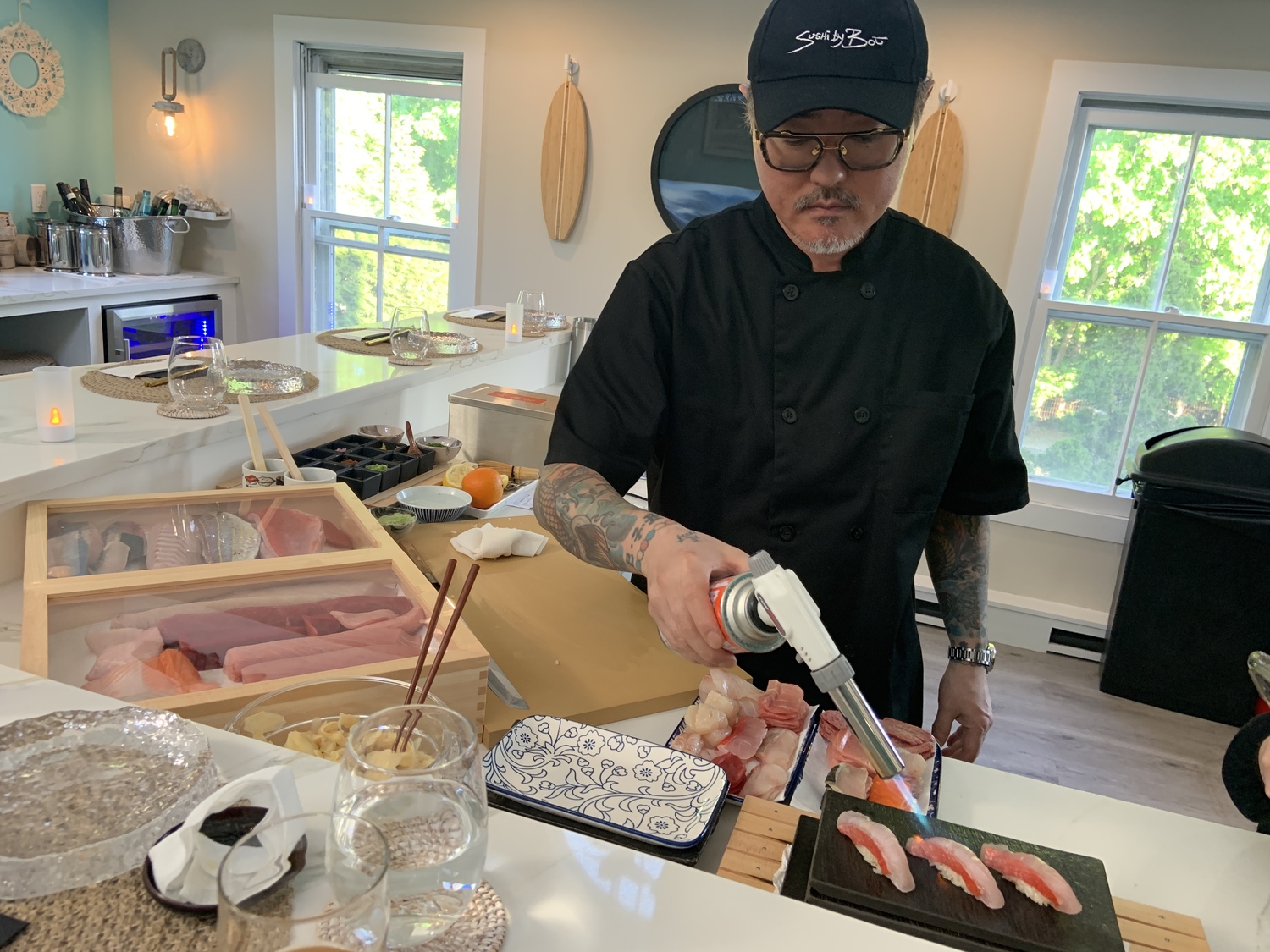
The owner of Sydney’s “Taylor” Made Cuisine on Mill Road is asking the Westhampton Beach Village Planning Board to approve the conversion of an office space into an eight-seat sushi dining room, dubbed Taylor’s Sushi Suite — though the omakase-style restaurant has been operating since the middle of May in defiance of a stop-work order and an “uninhabitable” notice.
Owner Erin Finley made her case to the Planning Board on June 22, and, in turn, a neighbor of Sydney’s told the board members why they should reject the application.
Finley said that after dealing with “the Building Department of the past,” she misjudged and forgot that the current village administration is approachable.
“I should have not based my decision on the experiences of the past and my interactings with boards and the village and the Building Department, and I should have inquired prior to doing any of this as to the proper procedure before moving forward with this venture,” she told the board, reading from prepared remarks. “I did not consider my relocation of eight seats to impact my operation in any manner necessitating approval from any agency, including this board.”
When she did meet with the building inspector, she said, it was determined that a change of use would be required for the space to become a tasting room or alternative dining room. She argued to the board that the plan is in line with the village’s downtown revitalization plan.
She said Sydney’s had been operating 25 seats on the front lawn four nights a week for dinner service and took that operation entirely indoors and reduced capacity to eight guests, in a “more remote, more secluded, behind-closed-doors area.”
“It is not a disturbance to anyone,” she said. “It is not causing anyone any problems.”
She recalled a local resident telling her: “You don’t buy a house next to the golf course and then complain that there are golf balls in your yard.”
“Noise is going to travel,” she said. “There is no shouting, there is no music, there is no amplified music.”
She said that when guests walk out at 6 p.m. and have a conversation in the parking lot, she shouldn’t have to cringe out of fear that the police will show up for a noise complaint.
“But it is constant. It is constant,” she said. “It is unfounded. The police reports say there is no noise. As much as my neighbors should be allowed to enjoy their environment, I should also be able to enjoy mine.”
Kim Wolfersdorf, who lives at a property that backs up to the rear of the Sydney’s property, told the board she was speaking on behalf of the adjoining neighbors.
“This is not an issue of what is fun or popular,” Wolfersdorf said. “This is an issue of what is allowable and appropriate by current code in the hamlet commercial district. If I used my property to open a pot dispensary, it would be incredibly popular with certain groups of people — but my neighbors would not appreciate that, and it would not be allowable under code.”
She noted that the residential uses of her property and that of her neighbors’ are preexisting. “Erin is the one who chose to come here and change a professional office into a commercial use,” Wolfersdorf said. “Then she expects to operate as if it is a B-1 business district, and now acts surprised when we push back.”
She said the village’s master plan intended for the hamlet commercial zone, where Sydney’s is, to be a transitional zone — less commercial, less intense and 10 times more restrictive.
She accused the Village Board of selectively enforcing the code based on who the board members are friends with.
Wolfersdorf said Finley had agreed in 2014 that if she wanted to make any changes to her seating plan — 15 seats and seven tables — she must first submit a revised site plan application to the Planning Board.
“She has changed her seating plan without approval, made alterations and changes without Planning Board approval or permits,” Wolfersdorf said. “She also does not have approval from the office of wastewater management, the Department of Health or the State Liquor Authority.”
She also doubted that any downstairs seating would be swapped for upstairs seating, and pointed to an event advertised as offering sushi upstairs and a ceramics class downstairs as evidence of intent to use both spaces simultaneously.
Cocktails are offered on the roof deck for sushi patrons, she noted, and seating is offered around a fire pit out in front of Sydney’s.
“The stop-work order and a ‘keep out, uninhabitable’ sticker were posted on the door to the second-floor restaurant and ignored by everyone dining and working there. This includes Trustee [Rob] Rubio and his wife,” Wolfersdorf said.
Later during the hearing, Rubio’s wife, Stacy Rubio, took to the lectern and disputed that claim, saying, “As far as use of the Sushi Suite, Rob Rubio has never been there.”
A reporter did witness Rob Rubio pop his head into the Sushi Suite on May 17 — but not dine inside.
Wolfersdorf noted revelry on the roof deck, patrons urinating in neighbors’ bushes and other disturbances affecting the neighbors.
“This is absolutely impairing the peace and quiet of adjacent properties, and aren’t we entitled to the quiet enjoyment of our properties?” she said.
Addressing the board, Karl Macdonald, a Westhampton resident who previously owned the now-defunct Mill Roadhouse in the village, said he favors “anything that expands the dining experiences and nightlife in this town.”
The Planning Board will meet again on July 13. Whether the Sushi Suite is on the agenda again will depend on how soon Finley submits additional documents the board requested.